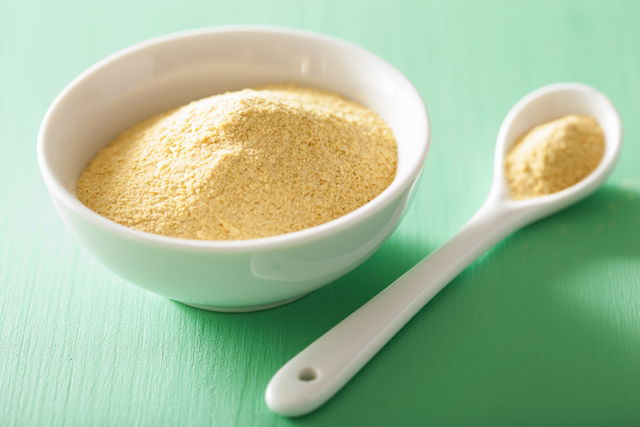What is it:
Nutritional yeast is a type of yeast scientifically known as Saccharomyces cerevisiae. It is often used as a nutritional supplement due to its high contents of nutrients like protein, fiber, B-complex vitamins, antioxidants and minerals.
Nutritional yeast can offer many health benefits, such as cholesterol management, preventing early aging and immune system strengthening.
This type of yeast can add nutritional value to many meals, which is why it is commonly used by vegetarians, athletes or people with nutritional deficiencies. It can be added to yogurt, milk, fruit or other recipes, like sauces, rice, beans, pasta or salads.

Health benefits
Nutritional yeast can be used to achieve many health benefits, such as:
1. Helping to treat irritable bowel syndrome
Some studies show that nutritional yeast can help to treat symptoms of irritable bowel syndrome (IBS), which is a disorder associated with gas, diarrhea, constipation and abdominal pain. Because it is rich in nutrients, nutritional yeast can provide prebiotic effects that improve intestinal functioning and improve general malaise from this illness.
2. Strengthening the immune system
Nutritional yeast is a great source of B-complex vitamins, selenium, zinc and iron. These nutrients are essential for optimal immune system function. In addition, this supplement contains beta-glucans, which are carbohydrates that act like immunomodulators that stimulate immune system cells. This process can help to prevent infectious diseases and promote wound healing.
3. Improving respiratory infections
Because it contains compounds that boost immune function, nutritional yeast can be used to fight active upper respiratory infections. It can reduce symptoms and make them more mild, as well as prevent their occurrence.
4. Boosting mood
Nutritional yeast is rich in carbohydrates, B-complex vitamins and iron, which are nutrients that are essential for optimal energy, as well as mental and physical performance.
5. Providing antioxidant action
Nutritional yeast is rich in antioxidants like glutathione and selenium, which protects cells against damage from free radicals. This protects the cells against changes to their normal functioning, which, consequently, prevents cancer and early aging.
6. Preventing anemia
Nutritional yeast is rich in B-complex vitamins and iron, which are essential for red blood cell formation. These cells are important for the transport of oxygen throughout the body, and low levels can lead to anemia.
7. Increasing muscle mass
Nutritional yeast is very high in protein and B-complex vitamins, which makes it a beneficial tool for athletes or people looking to increase their muscular mass. It can be used before or after working out, and can be added to yogurt, milk or fruit.
Check out other muscle-building foods that you can add to your diet to achieve muscle gains.
8. Decreasing LDL cholesterol
Nutritional yeast is rich in fiber and beta-glucans, which are compounds that decrease LDL cholesterol and increase HDL cholesterol. Therefore, nutritional yeast may prevent cardiovascular diseases like atherosclerosis and heart attacks.
Learn more about the types of cholesterol and what the normal levels are.
How to use
To use nutritional yeast, you should add 1 heaping tablespoon to drinks, soups, pasta, sauces, salads, fillings or bread.
Nutritional yeast should only be used as guided by a doctor or registered dietitian, especially in women who are pregnant or breastfeeding.
Nutritional value
The following table outlines nutrient quantities in 15 g of nutritional yeast:
Note that 15 g of nutritional yeast is roughly equivalent to 1 heaping tablespoon. It is important to check the product package itself, as nutritional yeast may or may not be fortified, leading to varying amounts of components from brand to brand.






























